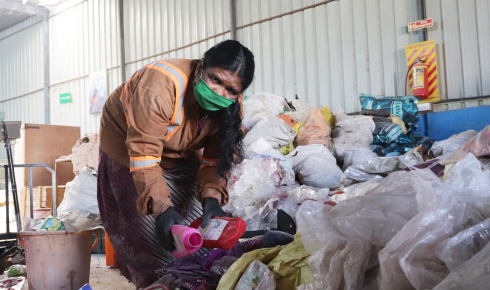Plastic waste has become one of the most pressing environmental challenges of our time. Globally, the world generated 353 million tonnes of plastic waste in 2019 – more than double the amount in 2000. Yet only 9% was recycled, while nearly 50% ended up in landfills and 22% was discarded in the environment. If current trends continue, another 33 billion tonnes of plastic could accumulate on Earth by 2050.
With India generating millions of tonnes of plastic waste each year, the need for efficient recycling systems has never been greater. This urgency has fuelled the rapid growth of plastic recycling plants in India, playing a pivotal role in supporting the nation’s transition towards a circular economy.
The Rise of Plastic Recycling in India
India generates about 9.5 million tonnes of plastic waste annually, making it one of the largest producers in the world, after the USA and the EU. The country’s plastic recycling industry processed 9.71 million tonnes in FY 2024, up 11.6% year-on-year, and is projected to grow at a CAGR of 11–12%, reaching 18–19 million tonnes by 2030.
The bulk of India’s plastic waste comes from polypropylene (PP),polyethylene (PE), andpolyvinyl chloride (PVC), with packaging accounting for the largest share. As per the National Circular Economy Roadmap for Reducing Plastic Waste, recycled plastic in India could reach 35.2 million tonnes by 2035.
What’s Driving the Rise of Plastic Recycling Plants in India?
Several key factors are accelerating the growth of recycling plants in India:
- Environmental awareness: Growing concern over the impact of plastic waste, especially on marine ecosystems, has made recycling a social and business priority.
- Government regulations: Initiatives like the Plastic Waste Management Rules 2016, bans on single-use plastics, Extended Producer Responsibility (EPR) schemes, and programs under the Swachh Bharat Mission are creating a supportive regulatory framework.
- Technological innovation: Advances in mechanicaland chemical recycling are enabling plants to produce higher-quality recycled materials that rival virgin plastics. Chemical recycling, in particular, can process plastics that were previously unrecyclable.
These developments are making plastic recycling plants more efficient, cost-effective, and capable of meeting the growing demand from industries.
Understanding the Circular Economy and Its Connection to Plastic Recycling
A circular economy focuses on keeping materials in use for as long as possible through reuse, repair, refurbishment, and recycling. By collecting, sorting, and reprocessing used plastic, plastic recycling plants turn discarded packaging, consumer goods, and industrial materials into high-quality raw materials for manufacturing.
Instead of discarding plastic after a single use, the goal is to reprocess it into new, valuable products, reducing dependency on virgin resources and lowering environmental impact.
Contribution to the Scrap Business in India
Plastic recycling is an integral part of the larger scrap business in India. While metals and paper have long been part of the recycling chain, plastic has emerged as a major player. Scrap recycling companies in India are diversifying their operations to include plastics, catering to industries that require recycled polymers for manufacturing packaging, textiles, automotive parts, and more.
The Role of Local and Regional Recycling Plants
Regional accessibility is key to efficient recycling. Small and large-scale recycling plants in India, including those categorized under plastic recycling companies enable quicker collection, sorting, and processing. This localized approach reduces transportation costs and carbon emissions while ensuring a steady supply of recycled material to manufacturers.
A prominent name in India’s recycling ecosystem, Jain Metal Group has been actively contributing to responsible waste management through innovative recycling solutions. While traditionally known for its metal recycling expertise, the Group’s vision aligns strongly with the growth of plastic recycling plants in India. By integrating sustainable practices into their operations, they are helping pave the way for a more resource-efficient and eco-conscious future, one where recycling is not just a business, but a commitment to the planet.

